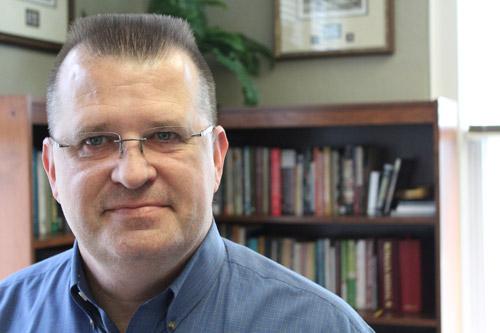
The first session of the Diocese of Little Rock School of Spiritual Direction will begin Sept. 20 at St. John Center in Little Rock with 34 deacons and laypeople from Arkansas and Texas.
Deacon Chuck Ashburn, director of the Office of Faith Formation, said a diocesan program like this is rare in smaller dioceses and particularly so outside college or religious community settings. However, the demand for spiritual directors in the parishes is prevalent.
“We get calls here frequently from people looking for spiritual directors,” he said. “This isn’t a ministry that’s well-known and yet when we went around the state to explain the program, more than 100 people showed up.”
While there is an increase in the number of laypeople interested in receiving spiritual direction, all priests, deacons and seminarians are required to regularly speak with a director.
The three-year program requires classroom work, a practicum and an eight-day retreat en route to completion and annual continuing education after that. Subject matter covered in the one-weekend-per-month classroom sessions includes foundations of spirituality and examination of the nature and species of prayer. The sessions will be held simultaneously in English and Spanish.
Students will be trained in evocative-contemplative methodology, the framework by which they will lead others to deeper relationships with God. Guest lecturers from Benedictine College in Atchison, Kan., and Creighton University in Omaha, Neb., among others, are slated to lead the weekend classes, as is noted author and educator Sister Maureen Conroy, RSM, of the Upper Room Retreat Center in Neptune, N.J.
Candidates for the new school not only commit to three years of study but must have completed 10 credit hours of prerequisite courses just to be considered. They also must have been under the guidance of a spiritual director for at least a year.
Ashburn is quick to point out the program does not try to “create” spiritual directors or promote a certain type of spirituality; rather, it gives people who have been called to this work the tools they need to be effective. It also stresses boundaries directors should observe.
“We’re not trained therapists and people need to be able to recognize when something comes up that is beyond their capacity and seek help,” he said.
The role of the spiritual director is similar to a success coach for a budding business executive. These specially trained individuals help a person deepen their relationship with God through regular one-on-one sessions, typically held monthly.
Ashburn has had a spiritual director for more than 20 years. In that time, he’s learned the unique relationship hinges not only on the director’s knowledge of spiritual matters but on the ability to approach advisees as individuals.
“My spiritual director is Msgr. Scott Friend and people pretty much said there’s no way that was going to work,” he said. “At the time we started, I was very rigid in some of my views and Msgr. Friend is very, ‘Well, what do you think God thinks,’ kind of guy.”
However, Msgr. Friend’s personality, while disparate from Ashburn’s, actually helped by providing fresh perspectives on matters of faith. Through their monthly sessions, Ashburn learned to drop his own agenda and desire for concrete results and learn to abide by God’s schedule.
“There were lots of times I would come in and be like, “I did all this and I don’t see God working, just tell me what to do.’ But then we’d talk about it and he’d point out places God was working that I just hadn’t considered or couldn’t see.”
Of the roughly 100 individuals statewide who expressed an initial interest in completing the course, about 70 applied and of these, 25 Anglo and nine Hispanic Catholics from 14 cities were accepted. The group includes five deacons and one Benedictine nun.
They are:
The class is scheduled to graduate in 2016 with certificates in spiritual direction.
Please read our Comments Policy before posting.
Article comments powered by Disqus Fort Smith church raising $2.5 million for security
Fort Smith church raising $2.5 million for security
 MSM senior an all-around winner in classroom and track
MSM senior an all-around winner in classroom and track
 Mount St. Mary alum rallied community after wreck
Mount St. Mary alum rallied community after wreck
 Deacon served in two Central Arkansas parishes
Deacon served in two Central Arkansas parishes
 Catholic Answers receives backlash for its AI priest
Catholic Answers receives backlash for its AI priest
 I knew in fifth grade Jesus was my best friend
I knew in fifth grade Jesus was my best friend
 St. Joseph a model of solidarity with immigrants
St. Joseph a model of solidarity with immigrants
 Two gifts after Jesus’ death: Virgin Mary and Eucharist
Two gifts after Jesus’ death: Virgin Mary and Eucharist
 Why we have an altar, and not just a communion table
Why we have an altar, and not just a communion table
 Pope: Wars should be resolved through nonviolence
Pope: Wars should be resolved through nonviolence